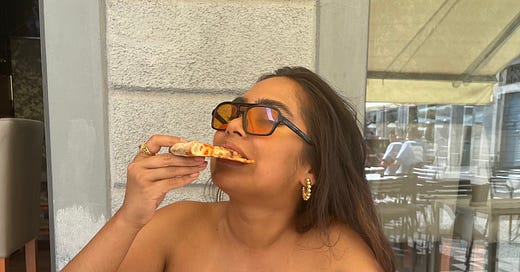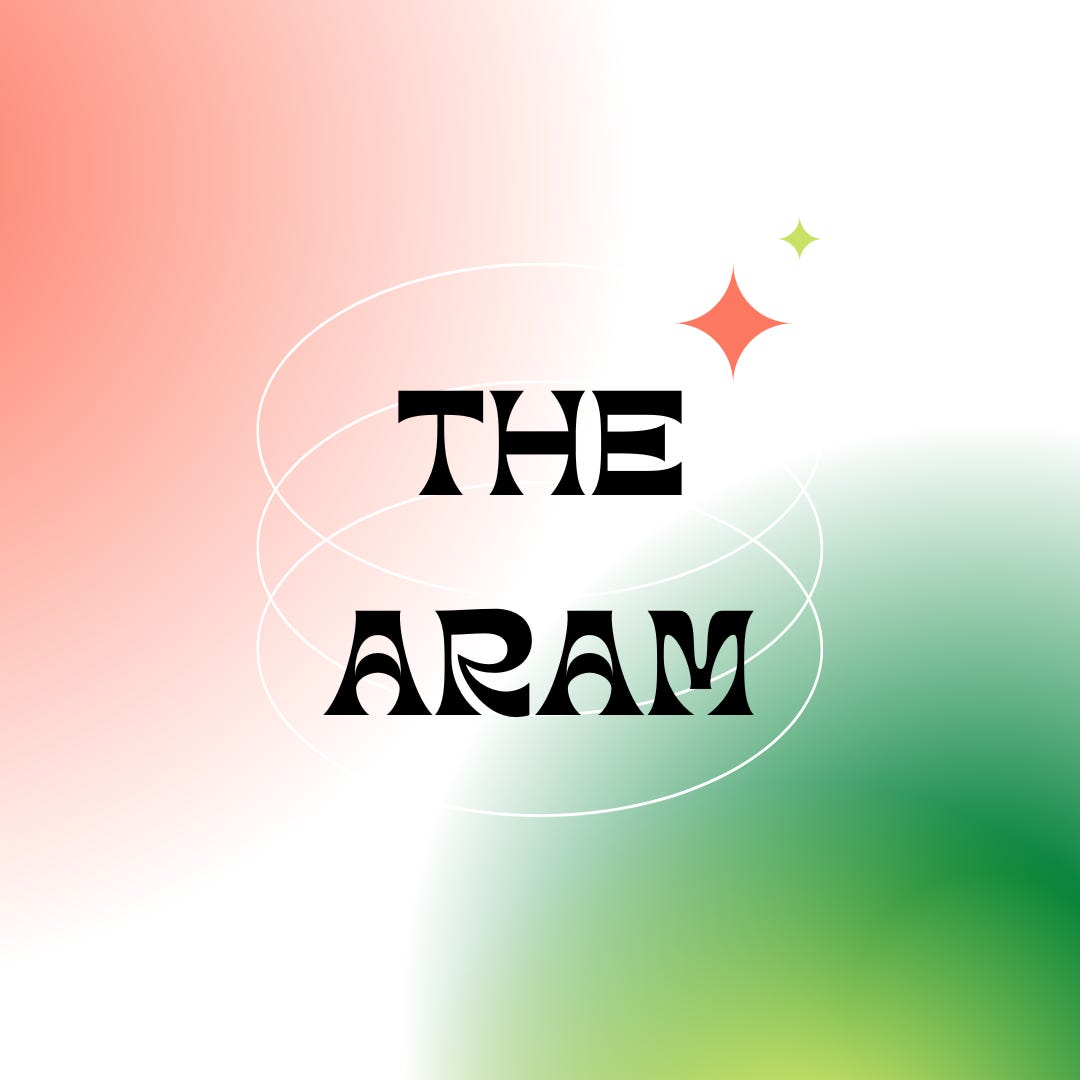“Have you eaten?” equals “I love you.”
A very special guest post written by journalist and writer Tahmina Begum
Tahmina Begum is a writer who wears her heart on her sleeve. Perhaps this is why I’m so drawn to her work – as both a journalist writing for the likes of Vogue, The Guardian, Refinery 29 and Dazed, and as the author of her own Substack newsletter, The Aram, where she explores joy, love and what brings ease to women of colour and Muslim women. I love that her long-form writing so vulnerably and powerfully meditates on her heritage, friendship, introspection; and that her Instagram captions offer a dose of much needed confidence to all women. She’s funny, she’s intelligent, she’s questioning: all the hallmarks of a great writer. So I’m very excited that Tahmina is guest posting this newsletter – so here she is, answering a few questions and writing all about family, food and love. You can find Tahmina on Instagram, Twitter and you can read her Substack, The Aram, too.
What's a dish that reminds you of home?
Anything that is a Bangladeshi dish that you cannot usually buy at your local Indian (which is usually Bangladeshi-owned btw). So your mooki with fish. Oori and tiny prawns. And satnis. Or bhorthas depending on what region you're from. The mashing and combination of the sweet, sour, spicy and salty is the epitome of Bengali tastebuds.
Where is your favourite place to eat a meal, and who would you be with for it?
It is either sitting and eating dinner on my lap while something easy like Love Island, FRIENDS or Ugly Betty is playing in the background and I’m by myself after a long day of thinking, writing and using my brain. Or it’s on a balcony perhaps in Lake Como or Malta or anywhere with a great view of hills and water and gossiping with a Loved One.
Any food rituals that you have?
Always wash your hands before a meal (duh). Always say Bismillah and get your body ready for food with gratitude - that you can access this food easily, financially, and it is ultimately food to experience not to survive Alhamdullilah. And if I can, always eat with your hands. It just makes everything taste better.
What's your comfort food?
My cousin Fahima, runs a Bangladeshi food platform called Mosa Mosa where she plays with Bengali flavours and fuses them with usually a contrasting cuisine. For my birthday she churned some spicy Mr Naga butter (with her hands!!) and she’s hosting her first supper club in London in March (which sold out in less than 24 hours). I digress to say, she makes these zaal arancini balls that I will physically fight and steal for. I have no shame in getting what I desire, especially when it comes to eating delicious food made by those who wish to love me through food and therefore love what they’re cooking too.
There are many days when my Nani has no idea what my day has consisted of but she has always known what I have eaten. Between requests to hand the phone to my mother, in those 15 seconds of answering, Nani will know what I have consumed for breakfast, lunch and dinner. In addition to the leftover dishes she handed to my mother for me to eat. Like an umbilical cord, ‘Have you eaten?’ is also the question that comes out of my mother’s mouth almost every day.
For diaspora kids and their immigrant parents and grandparents, there is an inevitable generational gap in experiencing life. Opinions on what you should put your money towards to who and when you should marry and what you should centre your life around. All of this amounts to how much of your heritage you wish to carry with you and what you choose to let go of; like weighing up how much jeera to add to a mutton curry.
But there is one thing I know and that is food is the universal love language. More than the melodies that stir what’s native about a country, more than the storytelling found in the literature but rather the storytelling shared across the dinner table.
Everyone has to eat so there is a shared experience of tasting comfort, savouring something sour that makes your lip purse together and the scooping and polishing of rice, aloo and chicken curry mixed with turmeric-coloured daail from the side of your plate, be it if you live in Sylhet or in the West Midlands. Eating these passed-down recipes is one of the only experiences we know we have in common with our ancestors.
There have been many times when I have been frustrated by the lack of intimacy in my familial relationships. The feeling that they don’t really know me know me as my friends would. That there is space between who I am thought to be versus who I am. So when the constant question of ‘Have you eaten rice today?’ has been repeatedly asked, I have previously snapped back that I am either not hungry or even reminded them in return that they have already asked me that question. And if I’m feeling particularly sensitive, is there anything else you would like to know?
But in fact, nothing else matters.
And understandably why.
My Bengali grandmother and the generations above me have not always encountered food in the same ways that I have. For so long, as an independent woman without the responsibility of children, I have been able to buy artisan sandwiches for lunch before heading back to a creative office where cupcakes are delivered most days. Sometimes, my nani reminisces about her childhood when her snack of the day depended on what the trees were willing to let go of (unless you were brave enough to climb for your stomach).
I have been able to get up and taste tofu done right in the heart of Tokyo without having to think about who else I may have to consider; bringing only my passport and Earthly desires with me. I can afford to buy fresh seafood at lunch in La Petitie Poissonnerie in Marylebone without the tab really racking up cause I’m not taking my entire community with me to eat; whereas my parents would never go out to eat unless it was with their extended family. My grandparents discovered what they would be eating after fishing for their dinner mid-afternoon in their local fushkoni; I experience paid-for press dinners.
Sometimes on the taxi ride through London to home, there is an empty feeling of being singular. It is not loneliness but sadness that the women who made the homes I was raised in and the men who provided for such homes will not be able to experience food in its luxury in the ways I will have access to. And on the flip side, I am conscious of the fact that perhaps, they simply don’t want to. That expensive food is not a luxury nor an experience they value as much as eating with everyone you presently love is.
And as time goes on, there is an unconscious awareness that my body will move further away from the act of sourcing and therefore appreciating food that has been nurtured and sometimes cooked in the heat of the ground. Protected and wrapped in banana leaves, a method that was once upon a time the only way to eat a certain bhetki maas and rice dish.
So I’ve learned now that when my Nani asks me if I’ve eaten today, it is in fact, a way to pull me closer and ensure that the space between us does not become so deep that we cannot share experiences. It’s a way to ask if I thought this boroi was sweet or tenga too and do I like eating spicey, buttery sweetcorn as a snack when I’m watching TV too?
As I watch my green-fingered grandmother — her touch can only be divinely granted —pull out bottle gourds, green and orange speckled pumpkins, round baby cucumbers and all kinds of runner beans from her garden, I remember that this is the woman I come from. My connection to Mother Earth.
Every FaceTime call that begins with ‘Have you eaten?’ and ends with ‘So what are you going to do and eat now?’ and somewhere in the middle includes a show-and-tell of her various chilli plants, preciously showing off their size, albeit grown in concrete weather, is this unsaid said way of saying ‘I’m here, I love you, I want you to know who I am too and that I care’.
It is no wonder that when I recently watched Banglatown Banquet for the first time, where the protagonist Sofia is deciding if the taboo of divorce is something she can live with; her independence is shown through the pumpkin she is growing on her balcony. This is something she did for herself.
On days I’m feeling morbid and trying to feel the worst of what’s to come before it even has begun, I wonder as I get older who will ask me, three, five, seven times, a day if I have eaten and in that kind of way, only grandmothers can.
Now when my Nani says ‘Have you eaten?’, I now know it is a way of saying I love you shuna faki. That Love is a verb, a Doing Word. It is a way of saying, that’s why I want you to only ever feel full. I love you so I only ever want you to physically know that you are cared for. That this food is tangible energy and it says while in the quiet of our chews; sit here with me and let’s eat together the words that can sometimes only ever be felt.












An honour to write for one of my favourite newsletters. Thank you for having me Cat 💕💕💕
Gorgeous reflection on bengali food and love. I knew a loved someone when I wondered if he had eaten. I always ask this question now like your nani